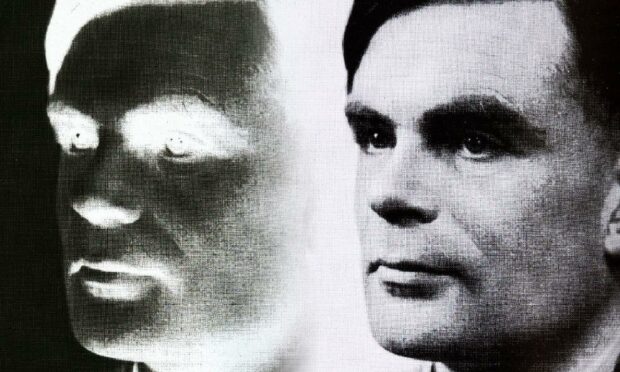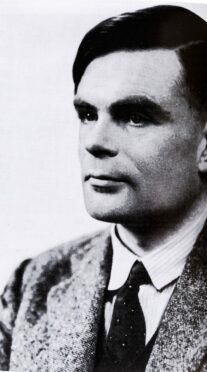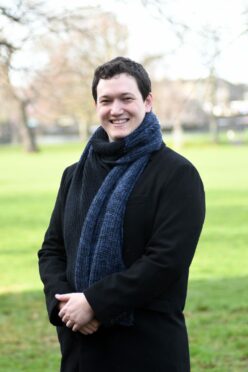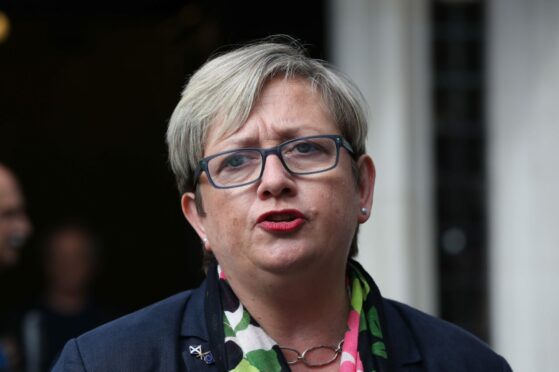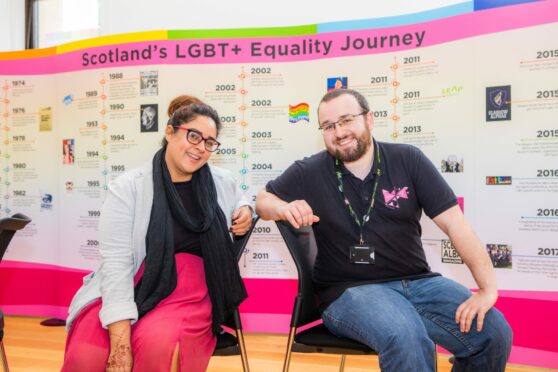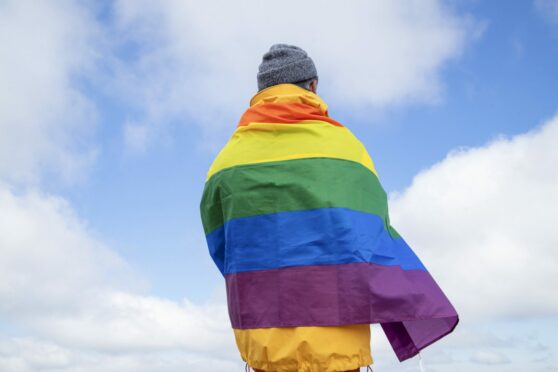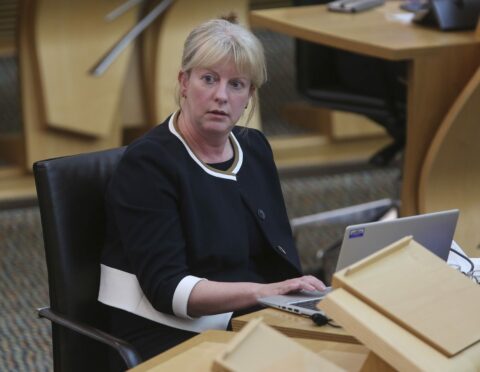A new group is being set up to advise the Scottish Government on what it can do to ban the controversial use of conversion therapy linked to sexual orientation and identity.
Campaigners and mental health experts have been asked to join the group after a Holyrood committee heard harrowing experiences of those subjected to it.
A petition calling for a ban is currently making its way through parliament.
With so much attention at Holyrood and Westminster, more people are asking what it means, what the law says, and how it fits into wider discussion in the LGBT community,
What is conversion therapy?
Conversion therapy is any intervention that seeks to change a person’s sexual orientation or gender identity.
It can take a variety of different forms, such as talking therapies, aversion therapies, hormone therapies, even exorcisms.
Probably the most well-known case is that of Second World War codebreaker Alan Turing.
Despite now being celebrated as a mathematical genius, Turing was forced to take hormone injections to suppress his sex drive after he was convicted of homosexuality.
He took his own life two years later and was posthumously pardoned by the Queen in 2013.
Why are there calls for a ban?
Technically there are no laws stopping conversion therapy in Scotland.
Many people are still subjected to conversion therapy. According to the UK Government’s LGBT survey in 2018, 51% of respondents said they had been offered or had undergone conversion therapy.
On top of this, 13% of trans people who responded had experiences of this, and according to Stonewall UK, ethnic minority LGBT people are twice as likely to be targeted.
Tristan Gray, one of the founding members of End Conversion Therapy Scotland, said: “Conversion therapy is clearly still happening in Scotland.
“In a more moral sense if there is the conception that LGBT+ people are broken or need fixed there is a broader social impact that perpetuates the idea that LGBT+ people are not an accepted part of society.
“So (a) ban would protect people directly targeted by abuse in conversion therapy, but it would also send out a message that Scotland is a safe place to be.
“People are shocked this is still happening and are surprised there is no legislation whatsoever.”
What if someone consents to conversion therapy?
Some who are wary of a complete ban on conversion therapy say people should be allowed to consent to something that others disagree with.
However, those calling for the law to be changed say it is impossible for someone to consent to conversion therapy because the outcome is harmful and the process is torturous.
… due to internalised stigma, guidance from people in positions of authority, & other powerful social influences such as fear of rejection & ostracism I would expect that any ban that does not cover consenting adults to have only a limited impact on ending conversion therapy…
— End Conversion Therapy Scotland (@ECTScotland) November 16, 2021
Tristan added: “We reject the concept that someone can consent to being abused in this kind of way.
“It has a terrifying impact on people.”
How does this fit into the trans debate?
Campaigners are keen to make sure any ban on conversion therapy covers trans people as well as gay and bisexual people.
Recently Joanna Cherry MP came under fire from political and LGBT+ groups for suggesting a potential ban should not cover trans people.
She tweeted: “Regarding conversion therapy, which any right thinking person should oppose, we must not make it a criminal offence for therapists to try to help patients with gender dysphoria to feel comfortable in their birth sex.
And re conversion therapy which any right thinking person should oppose we must not make it a criminal offence for therapists to try to help patients with gender dysphoria to feel comfortable in their birth sex. As we used to say #Somepeoplearegay. #GetoverIt
— Joanna Cherry QC (@joannaccherry) November 13, 2021
“As we used to say #somepeoplearegay #getoverit.”
End Conversion Therapy Scotland says anything that does not cover trans people can’t be called a complete ban.
How will this affect religion?
A number of religious leaders have told MSPs they worry a ban could impact the right to religious freedom, and potentially criminalise praying and pastoral care.
Stonewall says it is particularly keen to make sure any ban covers religious conversion therapies, which can range from private or public prayer, to beating the homosexuality out of people, believing they are possessed by demonic spirits, and starving people of food and sleep.
Peter Lynas, UK director of the Evangelical Alliance, worries ministry leaders risk being arrested if they encourage young people to remain chaste until marriage.
Others worry a ban would restrict traditional religious teachings, such as the belief that all sex outside a heterosexual marriage is sinful, and limit parents’ ability to bring up their children in the way they want.
However, a number of other religious groups have already publicly said they support conversion therapy being made illegal, including Ahmed Shaheed, the UN special rapporteur on freedom of religion or belief, the Church of England, Methodists, Quakers and the Hindu Council UK.
A spokesperson for Fife-based LGBT+ charity Pink Saltire said: “We continue to base our policy position firmly in the reality of the LGBT+ people we work with – that so-called conversion therapy is abuse and should not be acceptable in any situation.
“For any LGBT+ person to be subjected to unnecessary shame or repression based on someone else’s belief is wrong.
“Whether they are faithfully held views or not, is frankly irrelevant.
“LGBT+ people should not be subject to the often cruel and degrading treatment in the name of faith or parental beliefs.
“In all our years working with LGBT+ people, the reality is that when parents support their child to be their true authentic self, they blossom, surely something every parent wants for their child.”
What would a ban not include?
There are some things that wouldn’t be covered by a ban, such as the holding, writing, teaching, preaching, researching, reporting or declaration of beliefs on the morality, ethics and preferences of LGBT+ people, or the religious or legal recognition of their relationships.
It also would not stop someone from supporting another with personal, emotional, psychological or spiritual struggles, as long as that didn’t seek to suppress, “cure” or change their sexual orientation or gender identity.
Therapy and private conversation exploring a person’s sexual orientation or gender identity also would not be banned.
And seeking help or offering gender transitioning healthcare to trans and non-binary individuals would also not be covered by a ban on conversion therapy.
Where is conversion therapy already banned?
The first country to ban conversion in some form or another was Brazil in 1999.
Others include Norway, Malta, Switzerland, Germany, Albania, Samoa, Argentina, Fiji, Taiwan, Uruguay, Ecuador, Chile and India.
A number of local provinces in Canada, Spain, Australia and the USA have also banned it.
And a number of others are currently considering a ban, such as Ireland, Canada, New Zealand, Israel, Denmark, Finland and France.
When the UK Government published its LGBT+ action plan in 2018 it also included a commitment to ban conversion therapy in England and Wales.
What does the Scottish Government say?
The government says it will introduce legislation to officially end conversion therapy by the end of 2023.
Social Justice Secretary Shona Robison said: “We are clear about the need to end conversion therapy practices in Scotland – ensuring that everyone, regardless of their sexual orientation or gender identity, is safe from them.
“These practices are harmful, discriminatory and have no place in our society.
“Work is now underway to establish an expert advisory group on banning conversion therapy and its remit will include recommending an agreed definition of conversion practices.
“We will explore how legislation can best protect and support those who need it, while ensuring that freedoms – including freedoms of speech, religion and belief – are safeguarded.
“We are also considering what non-legislative steps we can take to end conversion practices, and support survivors.”
